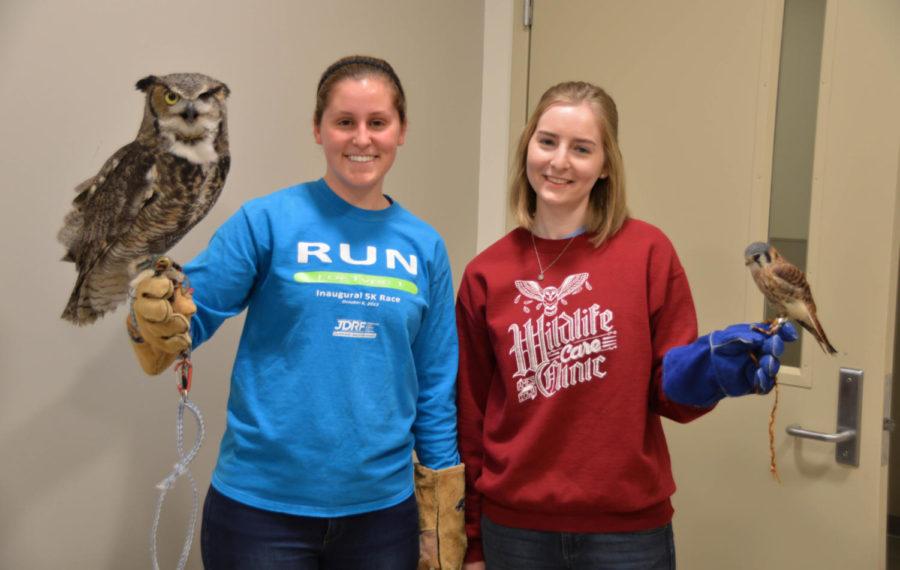Wildlife Care Clinic comes together to help animals
Maddie Leopardo/Iowa State Daily
Amanda Bowen, junior in animal science and Mary Masek, senior in animal science pose for a photo with two of the permanent animals of the Wildlife Care Clinic. Bowen (left) holds Harvey the Great Horned Owl, and Masek (right) holds Kessie the American Kestrel.
March 9, 2017
Do you know what to do if you find an injured animal?
The Wildlife Care Clinic on the campus of the College of Veterinary Medicine is a nonprofit organization that is here to help care for injured wildlife.
The Wildlife Care Clinic runs on donations, fundraisers and income from educational programs, with all the money directly benefiting their wildlife patients in terms of medications, diagnostics, surgery and food.
The clinic operates out of the Lloyd Veterinary Medical Center in space that was donated for the clinic by the veterinary college, according to the College of Veterinary Medicine website.
Established in 1984, the clinic is currently run by Bianca Zaffarano, assistant professor of veterinary clinical science and director of the Wildlife Care Clinic for the last eight years.
“We are the first line of triage for injured, orphaned, foundling wildlife,” Zaffarano said. “Our focus is to either repair them or get them to a rehabilitator, so then they can go back to the wild.”
The clinic focuses on caring for wildlife with the goal of getting them to return to the wild.
The primary goals for the clinic are to provide medical attention, rehabilitation and facilities for injured or orphaned wildlife, according to the Wildlife Care Clinic’s mission statement.
The Wildlife Care Clinic is a nonprofit organization that relies on donations and volunteers to carry out their mission.
“[The Wildlife Care Clinic] is generally run by a cadre of undergraduate students,” Zaffarano said. “About 150 people volunteer at any given semester, and we couldn’t do without them.”
Volunteers do not need a background in veterinary medicine. The clinic looks for those who have a passion for helping wildlife.
“They can be from all over and any discipline on campus.” Zaffarano said. “As much as the staff feels comfortable with their training, [the volunteers] are included in that.”
Along with the goal of helping animals return to the wild, the clinic aims to educate the public on the importance of native wildlife and the environment, according to the College of Veterinary Medicine website.
While Zaffarano said the clinic does not keep pets, it does have educational birds that help teach the importance of Iowa’s native species. Harvey, a great horned owl, is the clinic’s educational ambassador, according to the Wildlife Care Clinic Facebook page.
Along with Harvey, one of the clinic’s ambassadors was an opossum named Ernie. Ernie was rehabilitated from frostbite but couldn’t go back to the wild. Zaffarano fondly recalls her work with him.
“He became one of our ambassadors, and our staff fell in love with him and so did I,” Zaffarano said.
In order for the clinic to continue to help Iowa wildlife, it has to rely on the help and support of the community and the veterinary school.
“We need corporate funding, we need private funding, we need funding period,” Zaffarano said. “There are new regulations all the time that require us to upgrade our facilities, and that capital investment takes a significant chunk of money.”
Zaffarano said she is not well versed in fundraising and that she could use some more assistance to ensure that the clinic can continue receiving financial support.
The clinic is looking for someone who has experience with fundraising for a nonprofit to help make it a sustainable future for the wildlife clinic, Zaffarano said.
There are also some measures the community can take to help assist the clinic. Calling the clinic before bringing in an animal can be helpful in determining if the clinic can be of assistance.
















